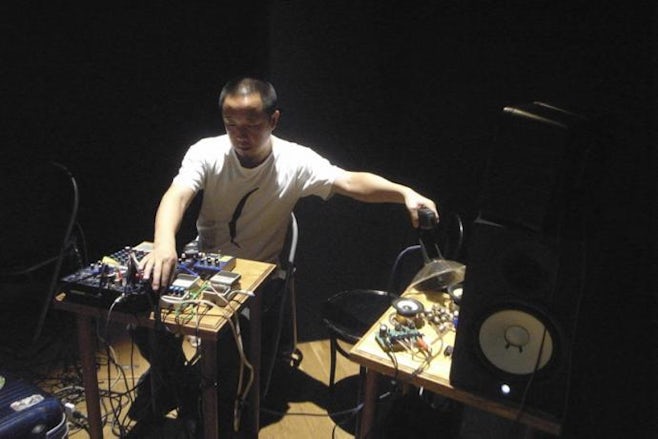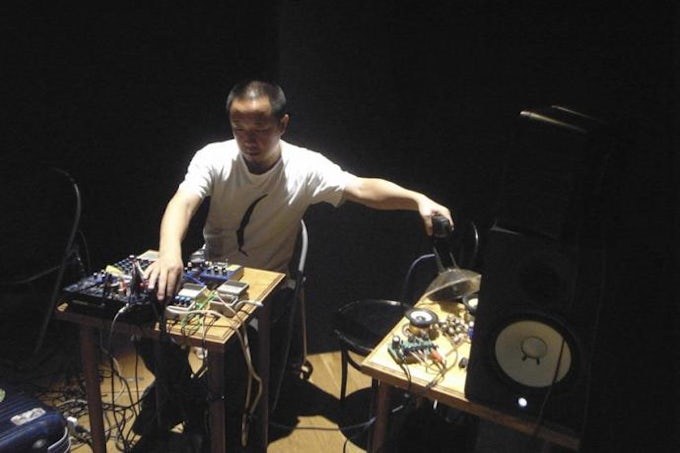
Beijing artist Yan Jun could be described as the invisible glue holding together the Chinese experimental music scene. Working in the areas of feedback, noise, voice and field recordings, Yan has been prolific as a recording and touring artist. As a writer, he has chronicled and critiqued China’s emerging underground noise movement, while fuelling it with countless CD releases on his labels Subjam and Kwanyin Records. In 2005, Yan began the weekly music event Waterland Kwanyin at the pub 2 Kolegas, on the grounds of a drive-in movie theatre. The event ended in January 2010, after 167 shows, and Yan now curates a monthly performance at the Beijing contemporary art centre UCCA. Mini Midi, the annual festival he organises on a small stage at Midi Music Festival, the nation’s largest rock music event, attracts crowds of up to 1,000 people. Featuring local and international artists, panel discussions, DJ sets, film screenings, massages and fried cakes, Yan has described Mini Midi as a ‘sound action gathering’.
Often labelled an artist-critic-impresario, Yan rejects such titles, directing his energy towards driving China’s noise community, which grew out of the more abrasive textures and hard-edge territory of the nation’s rock scene of the 1990s. Growing restless with the strict format and sound palette of rock music, many musicians in the mid-90s began jumping off into new territory, experimenting with tape recorders, free-form structure, found objects, chance and atonal frequencies in manners different to the innovations of the Western avant-garde and experimental music, of which they were largely unaware.
During Mao’s Cultural Revolution of 1966-1976, Yan says that the country’s classical academies remained relatively intact, servicing the needs of revolutionary opera and film. Independent avant-garde music, by contrast, was effectively non-existent and has had to be built up from nothing. During a time when the West was experiencing such phenomena as psychedelic music, punk and neo-Dada, in China intellectuals were being sent to rural labour camps for re-education.
The first wave of experimental musicians in the 1990s worked intuitively, with few existing models, while broadening their musical horizons by listening to the surplus, or dakou, CDs that were dumped onto Asian markets by Western record companies and ended up for sale on the streets of China. In the same period, Hong Kong musician Dickson Dee began bringing experimental musicians to China for the first time, including Otomo Yoshihide, Keiji Haino, Jon Rose, John Zorn and Eye Yamatsuka.
But it was in the early 2000s that an experimental scene in China truly began to crystallise. With the rapid spread of broadband internet, for the first time musicians began to develop an in-depth understanding of avant-garde and experimental music, listening to internet radio, downloading MP3s and cracked software, and accessing information through websites and online data bases. The decade saw the emergence of a number of artists, journalists, websites, record labels, festivals and clubs dedicated to the new music.
Yet while there is now an established experimental music network in China, Yan remains critical, saying that the scene needs to mature and focus more on quality. Fighting against the complacency that go can easily set in after any initial success, Yan says artists in China need to practice harder and strive for more than just a ‘social party’. In his article ‘The Sound of the Underground, Experimental and Non-Academic Musics in China’, co-written with Zbigniew Karkowski, he wrote, ‘This country is behaving like a child who is discovering a new world everyday. In the future, I think we need to focus on what we really want.’01 In the following interview, Rudolph Hudsucker, editor of White Fungus, a journal of experimental art based in Taiwan, speaks with Yan about his involvement with these developing music scenes and how he feels about the past now.
RUDOLPH HUDSUCKER: You’ve described in your articles how experimental and non-academic music basically started again from scratch after the destruction caused by the Chinese Cultural Revolution. In the absence of any memory of the more radical forms of music, what do you think spurred a move by Chinese artists in a more provocative direction?
YAN JUN: Musical form was not important. Or, there is nothing really radical without a time and space background. With a radical spirit, people will change and invent. Rock’n’roll was radical for Chinese youth in the late 1980s to early 90s. That was a key to starting the discovery of new forms of music and sound. In the 80s there was a faith in a better tomorrow. In the 90s the dark side was exposed and there was a feeling of rebellion among musicians of the underground. That’s why musicians who of the 80s are not so radical.
RH: What was so dark about the 1990s in China?
YJ: As you know, after June 4th, 1989, China fell into a frustrated and grey mood. The only thing people could do was to make money. The reality was too complicated and dangerous – people just tried to forget it. But the dark I mentioned was an inner darkness. We all have a dark side. In the 90s some young people touched their dark side because they wanted to change life, and they did this in a radical, somehow self-exiled or self-destructive way. Music and art are means to face the one’s internal dark side. In the 90s people got the chance to say farewell to their innocence.
RH: Speaking with the Hong Kong artist Lee Kit, he describes China as being a peculiar and unruly mix of capitalism and communism, which provides interesting conditions for making art. Would you agree, or do you think China is a purely capitalist society now?
YJ: I haven’t studied politics but I think China is forming a new form of capitalism that is beyond the Western framework. To say ‘capitalism plus authoritarianism’ is much too simple. You might have heard that the Chinese writer Liu Xiaobo won the Nobel Prize. This is a sign of the future: the capitalist world asking China to speed up invention, to kill all anarchic spirit by name, to discuss and manage everything, to build a pure black-and-white world.
RH: So much of the new music coming out of Beijing has been inspired by the creative work produced in the West during a time when the same artistic freedom wasn’t possible in China. How do you view the West now that artistic conditions there have tightened considerably and there is a growing aversion to taking risks? Do you still find inspiration in contemporary new music from the West?
YJ: In recent years (maybe the past ten years) there has been a large amount of publishing and research about the avant-garde history of the West. Something like, ‘Let’s end history if we have nothing to do’. It’s great for me to access ubu.com and hear all kinds of early electronic music or an avant-garde art archive. Iannis Xenakis and Karlheinz Stockhausen are always new. Now, I don’t know so much about contemporary music from the West. I’m more interested in Japanese new music. But I really enjoy Western musicians such as Jason Kahn, William Basinski, Dave Phillips, Derek Bailey and John Oswald. Sometimes I still listen to Chris Watson, Alvo Noto (aka Carsten Nicolai) and John Zorn.
RH: Listening to much of the experimental music coming out of China, I’m impressed by the overall quality, particularly given how quickly the scene has emerged. Nonetheless, I feel China is yet to produce an artist of the calibre of, say, Merzbow from Japan. Do you agree and, if so, what’s holding this development back?
YJ: I think most Chinese artists are musically malnourished. And Chinese artists are always being lazy (a way of resisting capitalism and the efficiency of Chinese businessmen, perhaps).
RH: Yes, it seems like capitalism is good at accommodating laziness as a form of protest back into its scheme. So you think laziness is a problem with artists in China?
YJ: Artists always enjoy life and labour, working hard. Maybe I’m wrong: I think artists also enjoy working. People love to play on stage but not to write emails and contact the equipment rental company. People love to drink together but not to do sound checks or rehearsals. I think this is maybe the artist’s privilege: being Dionysian. But anyway, I think there are so many parodies of Dionysus in China. So that’s a pity they can’t go any higher.
RH: Following your work in China, which encompasses so many different roles, from artist, writer, curator to promoter, I’m reminded of my friend Yao Jui-chung, in Taiwan, who plays a similar role in terms of the visual arts. In Taiwan I feel frustrated that other artists tend to take that energy for granted and won’t step up and make a similar contribution. A healthy scene surely must revolve around more than a single effort. Do you feel enough others are taking risks and putting in the hard work to contribute to what you are creating, or do you share my sense of frustration?
YJ: I’m not able to take on so many roles actually. I do everything as an artist now. I don’t want to organise so many things for everybody. I have 12,435 emails in my Gmail inbox and 9,112 in my sent box. Email murders creation and I don’t write reviews but only essays. I think my responsibility is to liberate myself from responsibility. Real artists always find ways to be active. They don’t lose anything if I stop organising concerts for them. And I will not die if there is no review about my works. Next year I will organise my Beijing tour, a series of home concerts, maybe a Shanghai tour as well, if I have time. DIY is good for one and for all.
RH: This is going back a bit but I’m interested in the ‘Tree Village Declaration’ you wrote in 2001, condemning the film Beijing Rocks by Hong Kong director Mabel Cheung (Zhang Wanting) about the Chinese underground music scene.02 The ‘Declaration’ was subsequently signed by almost all of the active bands and musicians of the rock scene, distancing themselves from the film. You had originally been involved as a script consultant and even introduced the director to many of the musicians. What prompted you to take such a controversial course of action and how do you feel about it now almost ten years on?
YJ: Not all of them signed it – just some of them, actually. Several days ago I read it again on the internet by chance. I feel fine about it. It makes me think about how difficult it is to do I’m doing now, compared to ten years ago when it was so easy to do. But now you need really tough thinking to find your standpoint – thinking on the edge of a knife – to see straight and to think about all the benefits you have that maybe make you forget you were once young. It was very easy to turn my face then. That was so hurtful for Zhang and her team. Sorry! There was no argument between us before the ‘Declaration’. Today I think it’s always worth fighting against the spectacle machine: media, entertainment, mass will, political drama, etc. In the past I fought against it with the ‘Declaration’. Today I fight against it by avoiding all kinds of declarations, since I have to end the logic of the dramatic illusion – which is the only thing you get from movements today.
RH: Thanks for your thoughts. It will be interesting to learn how Chinese experimental music develops from here.
Footnotes
-
Yan Jun and Zbigniew Karkowski, ‘The Sound of the Underground, Experimental and Non-Academic Musics in China’, World New Music Magazine, 2007, p.27.
-
Beijing Rocks was criticised for failing to take an honest look at the Chinese underground music scene, instead using it as a sensational background for a commercial love story.
